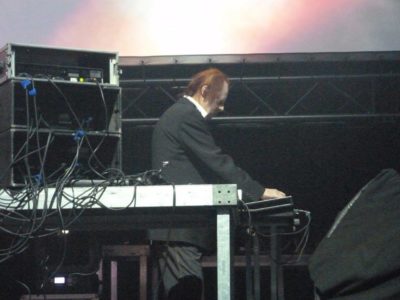The influential British electronic musician Richard H. Kirk, a founding member of Sheffield group Cabaret Voltaire, died last week aged 65. By any standards of innovation in any field he was a towering creative genius who led a singular and driven path throughout his life.
I went to Sheffield University in 1981, just when The Human League, Clock DVA, Comsat Angels, Heaven 17 and Cabaret Voltaire were creating a musical revolution in the ‘People’s Republic of South Yorkshire’ to rival Manchester. I spent half my meagre student grant at The Limit and The Leadmill clubs watching these bands. ‘The Cabs’ were my favourite live, their The Voice of America, Red Mecca and The Crackdown remain utter gems of exploratory sound today.
Kirk, along with Chris Watson and Stephen Mallinder, formed the group whilst at Sheffield University, taking their name from the Zurich nightclub that birthed the Dadaist movement, and began experimenting with electronic devices to make ‘music without musical instruments’. Inspired by the tech geekery of Brian Eno, they borrowed a synthesiser from the University’s music department, and acquired a sequencer and drum machine. The drummer-less trio used a Farfisa drum machine as mechanical bedrock for their tape loops, synth collages, and heavily modulated sound.
Much of their earliest public performance tended more towards being unconventional and provocative stunts rather than conventional shows. The trio would deploy to various parts of Sheffield with their portable tape recorders and play their experimental compositions in places as diverse as public toilets and on the streets from loudspeakers on the top of a friend’s van. This raucous and punkish attitude followed the band onstage to great effect. They became known for their provocative live performances, with frequent support slots to Joy Division, and were the first band to play Manchester’s iconic Haçienda nightclub. Made in Sheffield, love in Manchester.
In 1979, now augmented by Kirk’s abrasive guitar playing and samples from film and TV, the trio released Cabaret Voltaire’s debut album Mix-Up on Rough Trade. Nag Nag Nag will remain the song that The Cabs are best known for. The song is a bag-over-your-head-and-thrown-in-the-back-of-a-van journey, it seethes with tension and anger, a back and forth punching match with rhythm and pop undertones in one corner and flat-out experimentation set out to destroy song structure and conventional listening in the other. It really was just the beginning of their innovation journey, their head-butt opening to the world.
Watson left the band in 1981, and in 1995, Mallinder moved to Australia, and effectively ended the original Cabaret Voltaire. Kirk maintained a prolific solo career, once describing it as a combination of having too many ideas and taking a lot of amphetamines. He continued where Cabaret Voltaire left off through the remainder of the ’90s and into the 2000s with releases under his own name as Sandoz and a new solo project, Electronic Eye.
He revived the Cabaret Voltaire name in 2009 for a series of collaborations and live performances. In July 2014, Kirk performed as Cabaret Voltaire at a Berlin festival, the first in twenty years with a set list of all new material performed by a line-up consisting solely of machines, multi-screen projections and himself as the lone remaining member of the group.
In November 2020 he released an album Shadow of Fear, the first with Kirk as the sole band member. He was adamant that it was not an exercise in nostalgia: Cabaret Voltaire was always about breaking new ground and moving forward. It would be so sad to see it as a nostalgia act. The new material was recorded at Western Works studios, an old cutlery factory which was The Cabs original recording venue and a place that was a catalyst for other Sheffield bands. This was followed in 2021 by the release of two albums.
Kirk’s music was settled in electronics and tape loops, with dystopia and isolation at the core, but evolved to integrating technology with more humanitarian concerns. His palette was an evangelist of ambient, house and techno, African and tribal percussion and distorted vocals with sheets of noisy guitars. He was prolific to the end. He never once stood still or looked back, making unique records. He epitomised the combination of bluntness, self-effacement and love of experimentation that has fuelled Sheffield’s close-knit music scene over the years. Plus, Sheffield loves to dance!
His former bandmate, Stephen Mallinder, posted a tribute on Twitter which captured his presence: I’m shattered. my Cabs music partner and often sparring partner, difficult to live with but impossible not to love. Stubborn, no sufferer of fools, but insightful, spontaneous, and with vision and underneath the spiky shell a warm heart. I’m truly devastated. RIP Kirky.
Looking back over four decades since they formed, it’s apparent how frighteningly ahead of their time they truly were. They worked in a startling array of genres, but even more startling was their consistent success in being pioneers within each genre, fusing them to create varied sounds. Kirk was their innovation leader. He showed endless possibilities. He extended out into the new spaces, metaphorically and physically. That man could move.
Impose change on yourself. Keep exploring new avenues. Kirk said, I feel confident imposing change on myself. It’s a lot more fun progressing than looking back. But how exactly did his passion for reinvention and transformation manifest itself, and what did it teach us? The disruptor, the craftsman of his own self, manifesting uniqueness and original thought, what were the traits of the audacious musical visionary that we can reflect upon as genuine entrepreneurial genes? Here are my thoughts.
Be a Futurist – embrace experimentation There are many great examples of where Kirk created true innovation thinking. As a musical entrepreneur, he made clear statements of identity and profound declarations of autonomy and expression. It might have been over the top, but it never seemed unnatural. Kirk never succumbed to the stick-to-a-formula mantra, he frequently emerged with something completely new and unexpected. Not all of his experiments worked, but this willingness to try out new ideas, knowing that not all will triumph, is a trait every innovator needs.
Staying relevant by creating your own future Musical tastes change, new artists emerge and culture can move in a new, unexpected direction. For a while in the late 1990s new trends pushed Kirk to be an outsider, but he released new material like a dervish and came back and stayed relevant. The unexpected was his modus operandi. Innovators focus on their own trajectory. Of course, the legacy now replaces the future, but Kirk rode out the trends and fashions by creating his own future, not trying to compete – a true innovator.
The formula for his endurance is like a restless entrepreneur, never resting on their laurels, they retain the mix of uplifting, anthemic melodies with craftily serious lyrics in a business context. Kirk was a talented, spirited man, driven, passionate and more than willing to rebel against the norm. And that’s what every entrepreneur does too.
Stand for something, and be true to your purpose Kirk was strong minded and did whatever he wanted. He had a clear sense of purpose. He was shaped by deeply held personal and passionate values and remained true to them, quickly finding out that there were millions of people who shared those same values. Like a musician, put a tone of voice into your startup and stamp it with your personality.
Pacesetters guide the field. It may not matter in the end of you don’t win, but it brings people along. If you plan on getting noticed, establishing a brand promise, and creating an image is vital. John Pasche designed the ‘tongue and lips’ logo for The Rolling Stones in 1971, originally reproduced on the Sticky Fingers album. It is one of the first and most successful cases of rock brand marketing. Kirk had his own style and image too – what’s yours?
Being different matters more than being better Kirk became successful because he was different. He grabbed our attention. Rock stars have proven for years that being different and getting noticed because of it is more important than quality of music. Be different, stand out from the crowd. When opportunities don’t present themselves in a timely manner take calculated risks.
Kirk co-founded shaped a genre, and then some. Just copying something is no good, unless you want to just be in a tribute band. It’s vital to keep playing around and pushing yourself in business, create your own product. Don’t be afraid to build a startup model that plays to your strengths, even if it’s non-conventional.
Kirk teaches us that you have to be authentically yourself, to find what’s right for you, leading from your own place of uniqueness. Trying to be what others want you to be will lead ultimately to failure. You have to find what you do best, and find what is best about you.
Playing it safe gets you nowhere If you don’t take risks you’ll never excel. Playing it safe all the time becomes the most dangerous move of all. Deviate from routines. Rote activity doesn’t lead to the path of innovation or disruptive technology. Kirk never played it safe.
Kirk’s work has always drawn from a huge range of influences – dance, fashion design, film, literature, contemporary art, and music of all genres. His uniqueness was often the product of combining existing elements in new ways, producing something entirely his own, with a prowess for uncovering hitherto unknown sounds and beats, throwing them together randomly to discover new combinations and possibilities. This ability to create genuine uniqueness is a key trait of an entrepreneur.
Influence Visually as well as musically, Kirk’s influence shaped popular culture, he sits alongside the Human League, Scritti Politti and Joy Division from the early 1980s. Kirk’s innovation mindset shows the desire to be a self-defining individual and the process of disrupting existing norms. This is what Kirk teaches us about innovation: the importance of the fight, the mission, of change. Reinvent yourself, yes, but keep your eye on the goal, because when you know where you’re going it all becomes simple. He knew what he wanted to do and he got on and did it.
Music is the sound of the soul, the direct voice of the outer and inner worlds we inhabit. Our moods vibrate in response to what we’re listening too, setting free our emotions and at the same time bringing silence to life. The generation of music entrepreneurs that shaped my thinking – Lennon, Curtis, Strummer, Reed, Bowie, Budd, Kirk – are now all embraced by death, but their mantra for change and lessons for innovation live on.
You start to feel old when your heroes begin to die, albeit there may be some contradiction involved in speaking of heroism. It’s a term freighted with overtones of nobility and authority, but my musical heroes were like friends and their music spoke with intimacy. For me, Kirk was an inspiration as any entrepreneur with his spirit of innovation. I saw Cabaret Voltaire several times with Joy Division. Made in Sheffield, loved in Manchester. Enduring memories. Kirk is gone, another of the founding fathers has departed. People are trapped in history, and history is trapped in them, but Kirk is never past, always present.



